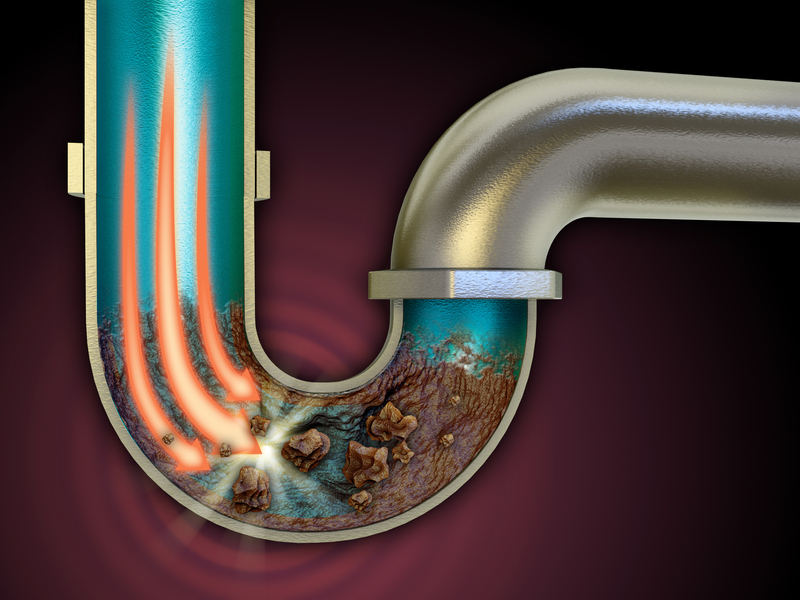Tactics for Developing and Following an Effective Cleaning Routine
Posted on 15/08/2025
Tactics for Developing and Following an Effective Cleaning Routine
Maintaining a clean and organized home or workspace can seem overwhelming, especially in our fast-paced modern lives. However, by developing and following an effective cleaning routine, you can enjoy benefits such as a healthier environment, reduced stress, increased productivity, and more free time. In this comprehensive guide, we will explore tactics for developing and following an effective cleaning routine, provide tips for sticking to your cleaning schedule, and discuss how to customize your plan for optimal results.

Why Is an Effective Cleaning Routine Important?
Before diving into strategies for creating an efficient cleaning regimen, it's essential to understand why maintaining a regular cleaning routine is so valuable. Here are a few key reasons:
- Healthier Living Environment: Consistent cleaning minimizes the buildup of dust, allergens, and bacteria that can negatively impact your health.
- Reduced Stress: A clutter-free, organized space can improve mental well-being and reduce anxiety.
- Improved Productivity: When your surroundings are orderly, you can focus more easily and accomplish tasks efficiently.
- Time Savings: Routine cleaning prevents the need for time-consuming deep cleans and unexpected emergencies.
- Guest-Ready Home: You'll never have to panic or rush if guests show up unannounced.
Core Principles of an Effective Cleaning Routine
To create and maintain an efficient cleaning system, certain underlying principles are vital:
- Consistency Over Perfection: Regular, manageable efforts yield better long-term results than sporadic, exhaustive cleaning sprees.
- Customization: Tailor your cleaning plan to your lifestyle, home size, family members, and specific needs.
- Prioritization: Not every task needs the same frequency or degree of attention. Identify the "must dos" versus the "nice to haves."
- Flexibility: Leave room in your schedule for unexpected events or necessary adjustments.
- Delegation: Share responsibilities with household members or consider professional help for certain tasks.
Step 1: Assess Your Space and Needs
Understanding your cleaning requirements starts with a thorough assessment. Walk through your home or workspace, taking note of:
- The number of rooms and their primary functions
- Areas that get dirty quickly (kitchen, bathrooms, entryways)
- High-traffic zones versus rarely-used spaces
- Cleaning tools and supplies you already have and what you may need
- Your household's routine and individual preferences
This inventory helps pinpoint problem areas and prioritize tasks, making your cleaning schedule more accurate and effective.
Step 2: Break Down Cleaning Tasks by Frequency
For an organized cleaning routine, divide chores into daily, weekly, monthly, and seasonal categories. This approach ensures you stay consistent without feeling overloaded.
- Daily Tasks: Make beds, wipe counters, do dishes, sweep/vacuum high-traffic areas, tidy up clutter.
- Weekly Tasks: Dust surfaces, clean bathrooms, mop floors, wash sheets and towels, take out trash.
- Monthly Tasks: Clean windows, deep-clean appliances, dust hard-to-reach spots (fan blades, baseboards), organize pantry.
- Seasonal Tasks: Declutter closets, deep clean carpets, wash curtains, clean outdoor spaces, change HVAC filters.
Pro Tip: Write down tasks for each frequency and keep your list visible. Over time, you'll develop a rhythm that helps keep things in check with minimal effort.
Step 3: Design Your Personalized Cleaning Schedule
An effective cleaning routine requires a written or digital plan. Following a structured schedule helps embed cleaning habits into your daily and weekly life. Here's how to create yours:
- Choose Your Format: Select a planner, spreadsheet, wall calendar, or cleaning app. Pick what you'll actually use.
- Assign Tasks to Days: Space out time-consuming chores through the week to avoid "burnout cleaning."
- Block Time for Each Task: Even 10-15 minutes makes a difference. Set realistic time slots for each activity, such as after dinner or before bed.
- Build Habits: Attach cleaning activities to existing habits--wipe counters after making coffee, vacuum every Saturday morning, etc.
- Set Reminders: Use alarms or sticky notes to remind yourself, especially when starting your routine.
Sample Weekly Cleaning Routine:
- Monday: Dust surfaces and vacuum living room
- Tuesday: Bathrooms--wipe down sinks, mirrors, and toilets
- Wednesday: Kitchen deep clean--appliances, counters, floors
- Thursday: Bedrooms--change sheets, vacuum carpets
- Friday: Floors--mop throughout house
- Saturday: Laundry and declutter entryway
- Sunday: Rest day or catch-up if needed
Step 4: Optimize Your Cleaning Tools and Products
Efficiency is greatly affected by using the right tools. Keep your cleaning arsenal simple yet effective:
- Multi-surface cleaners
- Microfiber cloths
- Disinfectant sprays/wipes
- Broom, dustpan, mop, and vacuum
- Brushes and scrubbers for tough stains
- Storage caddy or cart for mobility
Make sure tools are stored in accessible locations and regularly maintained. *Replace sponges and mop heads frequently* to prevent bacteria buildup. Consider environmentally friendly products for a sustainable routine.
Step 5: Involve Everyone in the Household
Sharing the load is essential to stick to an effective cleaning schedule. Here are ways to delegate:
- Assign age-appropriate chores to children (toys, laundry sorting, bed making)
- Divide tasks among adults--pair up or rotate weekly to test out what works best
- Use a chore chart or group checklist to keep everyone accountable
- Celebrate completed tasks by relaxing together or enjoying a treat
This not only lightens your load but helps everyone build valuable life skills and respect for shared spaces.
Strategies for Sticking With Your Cleaning Routine
Even the best plans can falter without motivation. To ensure long-term success, incorporate these proven strategies:
- Start Small: If overwhelmed, begin with one room or task and gradually expand.
- Stay Flexible: Life happens--if you miss a task, reschedule rather than abandon your routine.
- Make It Enjoyable: Listen to your favorite music, podcasts, or audiobooks while cleaning.
- Track Your Progress: Use checklists or apps to mark off completed tasks. Visual progress boosts satisfaction.
- Reward Yourself: Set up milestones and treat yourself to something enjoyable (a movie, a meal, or a relaxing bath) after a successful week.
- Review and Adjust: Regularly reassess your routine and tweak your schedule as needed to better fit your changing lifestyle.
Common Challenges and How to Overcome Them
Sticking to a structured cleaning regimen can be difficult. Here's how to tackle the most frequent obstacles:
1. Lack of Time
- Solution: Set a timer for short increments (10-15 minutes) and focus solely on cleaning during that period. Break bigger tasks into micro-tasks.
2. Lack of Motivation
- Solution: Remind yourself of the benefits--better health, less stress, and more free time. Set small, achievable daily goals and celebrate completion.
3. Overwhelm From Clutter
- Solution: Start with one area or type of item (books, clothes). Practice the "one in, one out" rule to stop accumulation.
4. Forgetting Tasks
- Solution: Rely on digital reminders or physical lists. Develop routines linked to existing habits (e.g., clean a bathroom right after morning showers).
Customizing Your Cleaning Routine
Every household or workspace is unique. Here are factors to consider when customizing your effective cleaning schedule:
- Household Size: Larger families or households with pets may require more frequent cleaning or larger time blocks.
- Work Schedules: Assign cleaning tasks around your busiest and slowest times of day.
- Special Needs: Allergies, young children, or mobility issues may impact how you structure your routine and what products you use.
- Home Layout: Open-concept homes versus traditional layouts may require different problem-solving approaches.
- Lifestyle: Love to cook? Emphasize kitchen maintenance. Entertain often? Prioritize living spaces.
Remember: Your cleaning routine should evolve as your life does--review, reflect, and adapt accordingly.
Useful Cleaning Routine Apps and Tools
Modern technology offers a variety of tools to help you manage and stick to your cleaning plan. Here are a few popular options:
- Todoist: Ideal for creating recurring cleaning tasks and checklists.
- Clean My House: A dedicated cleaning schedule app with reminders.
- Trello or Asana: Project management apps to visualize and track chores, perfect for families or shared households.
- Google Calendar: Set up recurring events and reminders for specific cleaning tasks.
Experiment with different tools until you find the one that keeps you most accountable and organized.

Long-Term Maintenance: Making Cleaning a Habit
The ultimate goal of an effective cleaning routine is to turn cleaning into a natural, automatic habit. Here are final tips to maintain momentum:
- Start with a manageable routine and gradually build as you gain confidence.
- Attach cleaning to daily habits for more consistency.
- Celebrate progress--no matter how small!
- Don't aim for perfection--good enough is often best.
- Be patient with yourself and those sharing your space.
Conclusion: Unlock the Benefits of an Effective Cleaning Routine
In summary, developing and following an effective cleaning routine doesn't require perfection or hours of work each day. Instead, it demands consistency, structure, and personalization. Assess your cleaning needs, break tasks down by frequency, create a schedule that fits your life, involve everyone, and adapt over time.
The true secret lies in making cleaning an effortless part of your daily rhythm--bringing you comfort, order, and peace of mind. Begin today and watch not only your space transform but also your enjoyment of it!
Ready to take control of your space? Use these tactics for developing and following an effective cleaning routine and experience the freedom a clean environment offers!




